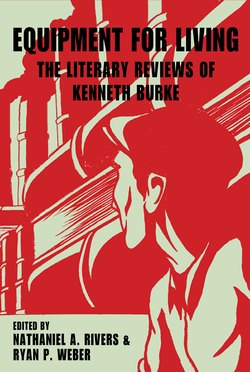Читать книгу Equipment for Living - Kenneth Burke - Страница 14
На сайте Литреса книга снята с продажи.
ОглавлениеLeave the Leaf Its Springtime
New Poems by Frederick Mortimer Clapp. Harper & Bros.
Poetry, July 1937, 226–229
If you are one of those readers who feel that there can be far more poetry in a compact definition than in the over-expansion of an image, I believe you will continually find eventfulness in Clapp’s New Poems. Clapp can demarcate situations with scholastic compression. “Luxor lies ruins,” he writes, in his poem “Peering at Pharaohs”—and I don’t see how you could do more with that. The two initial l’s, the two final hard s’s, with the middle monosyllabic word, as bridge, combining both—that seems to me gratifying, workmanlike language. It is the kind of accomplishment Clapp has often.
With such stylistic equipment he goes forth to encounter danger; at which point we must introduce our “however.” (If one wanted a ‘scutcheon for the family tree of modern thought, I propose as heraldic legend that strange device, N’eanmoins.) Clapp’s economy of production has its attendant rigor (“rigor” as in “rigor mortis”). One is led to speculate on the difference between an Egyptian, looking at an Egyptian mummy when Egyptian culture was alive, and ourselves looking at the mummy in a museum now, when its culture is dead. The poet, viewing the archaeological object under glass, hears outside an aeroplane; he imagines “the steep spiral climb / Of that mechanic hawk.” By varying incantatory entrances, each firmly constructed, he returns us to the same uneasy mood, such feeling perhaps as one might get on leaving the traffic-laden streets on a hot summer day and entering a cool, dark church (someone else’s church).
There are fears that one dare not confront, lest he be turned to stone. They are a Gorgon’s head. But if he makes for himself a stylistic mirror, he can observe the monster thus reflected—and he is not rigidified. The unexpected bottleneck in the economy of such production is this: It is when the poet is not viewing Gorgon’s heads in the protective mirror of his style, it is then that he is turned to stone. Or, translated: Our present poet can contemplate death with mastery; it does not freeze him; but when he holds his ingenious mirror up to life, he becomes petrified. He has an obol for crossing Acheron (even our great assertive steamships become her “Acherontic liners”)—but he passes out this obol constantly, which is a punishment.
Within these contextual limits, Clapp’s naming is expert. Here are, cautiously appraising,
clear cold eyes
That make of me an alien.
The strict inventory discloses that days were spent “in a grass-fire of activity.” The sexual act serves for “defying the Macrocosm.” He observes how
new astronomic ice ages set in
and new conventions of original sin.
As I became formed to the pattern, towards the end of his book I noted a poem entitled “Birth.” On the basis of past evidence, I ventured: “Somehow this birth will be a dying.” Partially, the poet outwitted me. He treats, with delicacy, of an opening leaf. He gets us to opening with it. But, he rounds out the matter thus:
Why does it tremble so on its stem?
Is it, its fulness found,
Tugging in an ecstasy of vitality still unconsumed
Towards disembodiment?
I felt that one should try hard to leave the leaf its springtime. However, the taking-away can be done in slovenly fashion or well. And Clapp often does it very well—positively, assertively, by scrupulous stylistic building.
